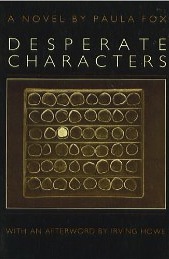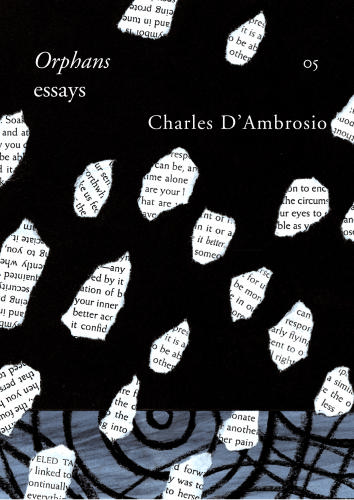That's the thing about Joy Williams; there is no one even close to similar. I once heard her say she channels spirit messengers, and her work reads as if that were very true. If you haven't read her, please do so right now. Admittedly, you might not want to start with The Changeling, as it helps to be a bit in love already before you tackle this one. Escapes is a good introduction. Become besotted, and then move on to this strange specimen of a second novel. Moody suggests that maybe the late '70s, with its "punk rock nihilism and...Studio 54 fatuousness" wasn't the time for this kind of tale. Thankfully, perhaps now is the right time?
Sample line: "There is no room in life for decorum! At times it is necessary to expose the skeleton within us, to make manifest the death within us."

Next up, Desperate Characters, by Paula Fox (also known for being Courtney Love's biological grandmother!). Published in 1970 to critical praise, it still ended up out of print. Also a second novel, Desperate Characters is a slim, taut, mysterious book filled with a slow building desperation that is creepy, thrilling and hard to summarize.
Jonathan Franzen fell in love with the novel in the library at Yaddo, but, when he went to buy his own copy, discovered it was out of print. He wasn't having it, and proceeded to make all sorts of awesome declarations about Fox being a better writer than John Updike and all of her other famous male counterparts. He also wrote an ode to the novel in Harper's, which finally got the attention of an editor at W.W. Norton.
It seems profound to consider the implications of a novel written during one period of time being reintroduced into the context of a new time and being perhaps even more significant. Franzen writes in his introduction: "Desperate Characters is a novel in revolt against its own perfection. The questions it raises are radical and unpleasant. What is the point of meaning -- especially literary meaning -- in a rabid modern world? Why bother creating and preserving order if civilization is every bit as killing as the anarchy to which it's opposed? Why not be rabid? Why torment ourselves with books?" These questions seem all the more pressing today, as a new set of readers gets the opportunity to read this fantastic book.
Sample line: "[She] felt an extraordinary relief as though, at last, she'd discovered what it was that could create a balance between the quiet, rather vacant progression of the days she spent in this house, and those portents that lit up the dark at the edge of her own existence."

When I spent a week at the Tin House Summer Writer's Workshop, it was in large part due to my love of the not-as-prolific-as-I-wish-he-was genius Charles D'Ambrosio. His impeccably crafted short stories in The Dead Fish Museum and The Point are some of my favorites. But his essay collection Orphans is the book I keep sitting on my desk at all times to remind myself of what it means to be a writer.
From a police stake-out to a hell house to a suicide note, D'Ambrosio finds ways to describe the world that I have never heard before, in turns exacting and lush with feeling. The book itself is a beautiful object, very small, with a ribbon book mark. Now out of print, it's a crapshoot whether you can find it online for $13 or $300.
When I nervously stood in line to have D'Ambrosio sign my copy at Tin House, he looked surprised to see it and asked, "Where did you find this little thing? I thought all the copies of it were in my garage." Now, thankfully, not only will the essays of Orphans be available outside of his garage, but D'Ambrosio has new work to share as well. In November, Tin House Books will publish Loitering: New & Collected Essays, which will include all of the eleven essays in Orphans.
Sample line: " The difference between the truth and a cliche is the difference between what we really know and what we've all heard about."





